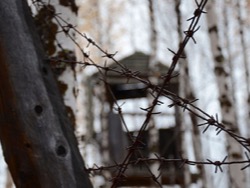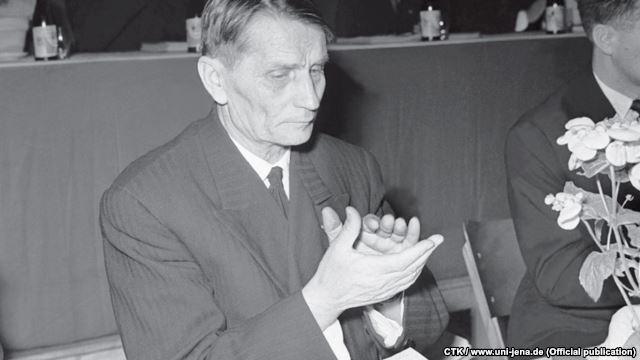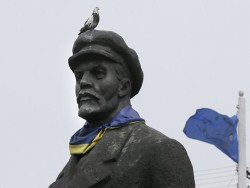
Why today so many Russians-good remember Stalin? “The majority of the society, the mentality of victims of terror: a willingness to repression, fear of power and demonstrative loyalty,” explains Irina fliege, Director of the St. Petersburg branch of the famous “Memorial”, respected non-governmental organization that exposes the Bolshevik terror in the post-Soviet space.
Lidovky.cz: the Stalin era are positive in 40% of Russians, although at the turn of the Millennium they were no more than 25%. Why the change?
Irina fliege: Speaking of Stalinism, we, in fact, talking about historical memory — issues which the memorial is engaged for 30 years, so I will explain the process from our point of view. This year, that is 2016, unfortunately, one cannot speak of historical memory from a traditional perspective — how about looking at the events of the past. After all, Russian society perceives the state of the Soviet terror not as past but as present. It is a relevant topic. This is not a historical memory, and the legacy of the past. Modern Russian society has fully adopted the Soviet legacy.
— Including self-deception?
This heritage stands on three pillars. The first is terror, the second is the experience of victims, and the third resistance to the regime, and each of them took a separate social group. The current government has mastered all the mechanisms of Soviet terror and puts them in a very similar way: it persecutes political opponents, falsifying materials, uses, and also creates different kinds of agents and spies.
The resistance can also be compared with Soviet times. As then, active resistance is small, but it is very diverse. People use Humanities and social way, organizing protests and rallies, fighting for civil rights and political freedoms…
Small group in power, and minority opposition. Remains the majority, which in their own way have adopted the mentality of victims of terror. That is, the willingness to repression, which is growing, given the real risk. Fear of the authorities. Demonstrative loyalty, and willingness to submit to anything. This is reflected in the percentage mentioned by you is the perception of themselves as victims.
— How do these people-the victims perceive the evidence of the brutality of the Soviet regime, which collects the memorial?
— This is a complex issue, particularly because attitudes change over time. In the late 80’s and early 90’s, many still experience remembered the GULAG, many children who in 1937 disappeared the mother took the father and is alive today only or their children or grandchildren. But it’s not just the change of generations. Of great interest to Soviet repression at the turn of 80-90-ies was associated with the period of transformation. Everything changed in her eyes, politics, economy, society, suddenly, he realized that with all of these changes should appear clear and defined position in relation to the past. They demanded the disclosure of the archives, access to full information…
But several years passed, and this information suddenly become completely unnecessary. Interest slept, and the reasons that different social groups could vary. Notable those who have been directly affected by the repression — personally or their relatives, that in 60-70-ies spoke against the regime. Even these people moved away from memory as if it sated: “All this I know, but I don’t need, not interested”. This moment in the middle of 90-h years, despite political pressure and attempts to justify it otherwise, from my point of view, was the biggest failure of our society.
— And today, 20 years later?
For years, we in the “Memorial” thought the basis of everything — the study of the past, analysis of mechanisms and memory of terror. The experience is based on memories, need to help today and that the past will really help. But today everything comes out absolutely on the contrary: according to current experience, we look at the past. But the interest in it is not lost completely, on the contrary, lately he’s enormous, at least part of Russian society. People everywhere face constraints and harassment by the authorities, and at some point they wonder what happened in the 30-ies under Stalin. Grandchildren and great-grandchildren want to know what it was with their grandparents.
The study of history through this prism is a very interesting trend. Never was interested in the UPA (Ukrainian insurgent army, associated with the name of Stepan Bandera — approx. ed.) like today. There has never been such fierce debate about the role of the Ukrainian army in Russian history. When Russians see the repression of the ruling regime and the way Russia acts in Ukraine, they wonder: “But how was it before? As Russia “liberated” the Baltic States?”
Memorial offers answers to a number of similar issues — to the displeasure of the government, according to which you “undermine the constitutional order in the Russian Federation”. How your work affected the November inclusion of the controversial Memorial in the list of foreign agents?
— War of the ruling authorities and the civil society is on several fronts, and one of them is historical memory, which represents the memorial. For story mode is a vitally important theme: it is taken as a hostage and interpret their own benefit. And we prevent this.
In the open discussions you will often hear that the work of “Memorial” “denigration of history”, but our work as such none of their political games are not affected. The name “foreign agent” we’re not entered, although required by law, and all our projects are still ongoing. We even started a few new ones. However extremely has changed the administrative part of our lives. We are constantly exposed to incessant inspections are continuously forced to provide some kind of reporting, to fill out the paperwork… it is Sad that in an organization like “memorial”, most of the work from the accountant.








